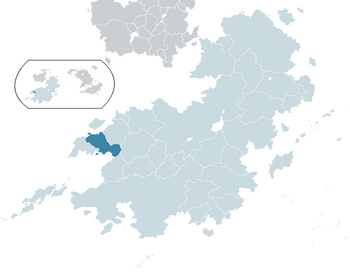Arthakhand
Republic of Arthakhand अर्थखण्ड गणराज्य | |
|---|---|
| Motto: यतो धर्मस्ततो जयः "Yato Dharmas-Tato Jayaḥ" "Whence Dharma, thence victory" | |
 Arthakhand (dark blue) located within Coius (light blue). | |
| Capital and largest city | Nadipatnam |
| Official languages | Samundrese |
| Recognised national languages | Utcalan Prasumi |
| Ethnic groups (2019) | Samundrese 37% Utcalan 28% Prasumi 22% Vanavasi 13% |
| Demonym(s) | Arthakhandi |
| Government | Unitary presidential republic |
| Abhijit Kamalanayan | |
• Premier | Jaidayal Indushekhar |
| Legislature | Sansad |
| Population | |
• 2020 estimate | 107,281,772 |
| GDP (nominal) | 2020 estimate |
• Total | $816 billion |
• Per capita | $7,607 |
| HDI (2020) | 0.627 medium |
Arthakhand (Samundrese: अर्थखण्ड Arthakhaṇḍa), officially known as the Republic of Arthakhand (Samundrese: अर्थखण्ड गणराज्य Arthakhaṇḍa Gaṇarājya), is a sovereign state in Satria, bordered by Sivathra to the west and Ajahadya to the south. It has a population of nearly 110 million, divided into 15 districts. The capital city of Arthakhand is Nadipatnam, with a population of 21 million people.
The area which makes up Arthakhand has been continuously inhabited for thousands of years, with archaeological remains recording the presence of sedentary agriculture from around 4,300 BCE and the existence of pastoralist groups before this time. Located at the delta of the Bashurat river, Arthakhand was a heartland for the development of the Sataro-Euclean peoples who arrived from the east and subjugated the endemic peoples. The fertile valleys of the Bashurat river helped grow several large states in the antique era, making Arthakhand a centre of religious and philosophical as well as economic exchange. This led to the birth of the Ashrama, philosophical and theological schools which centred upon religious asceticism and pacifism. Under the Ashramic period, which began around 700 BCE and which would continue until the emergence of the Sangma as a rival power, Arthakhand was the home of several wealthy states. However, at the coming of the common era, the Ashramic princedoms were subjugated by the Sangma dynasty. Arthakhand would remain under the Sangma for the majority of the dynasty's history, before the Nadipatnam Thakurate broke away and fought several wars with the central state. As Sangma power receded, more Arthakhandan Thakurates would break away, eventually forming a confederacy of princely states called the Arthakhand Confederacy. The confederacy would fight several times with the Togoti Khanate, and eventually pledged its loyalty as a vassal. Following the collapse of the Togoti Khanate, the Confederacy faced strong competition from the Rajadom of Ajahadya. Desiring support, Arthakhand turned to Euclea and especially Etruria and Narozalica. While this was at first manifested by increased trade and military advisors, the Euclean powers began to extract concessions. Kassar, modern day Nagapur, was granted to Narozalica following a limited armed campaign, and in 1863 the Sardar was forced by Etruria to cede his state to Etrurian rule. During the Great War, Arthakhand supplied troops to Etruria but was also a centre of activity for anti-Euclean resistance. Independence would come in the wake of the Solarian War, led by Hastin Tamonash of the Democratic People's Congress. Following independence, Arthakhand was caught up in the First Satrian war, and in the following decades Arthakhand fought several wars against Ajahadya which sought to unite the Satrian subcontinent under its rule. Detente began in the 80s, allowing Arthakhand to develop its economy.
Arthakhand is classified as a flawed democracy, having been dominated by the Democratic People's Congress since independence. Arthakhand is marked by a significant urban-rural divide, with the tribal Vanavāsi peoples facing institutionalised discrimination from the state. Ethnic and religious divides are also present, due to the diverse nature of the state which unites many different groups and religions. Economically, Arthakhand is a developing nation, reliant on agricultural production, manufacturing, commercial fishing, and tourism for much of the state's income. The current president is Abhijit Kamalanayan of the Democratic People's Congress.

